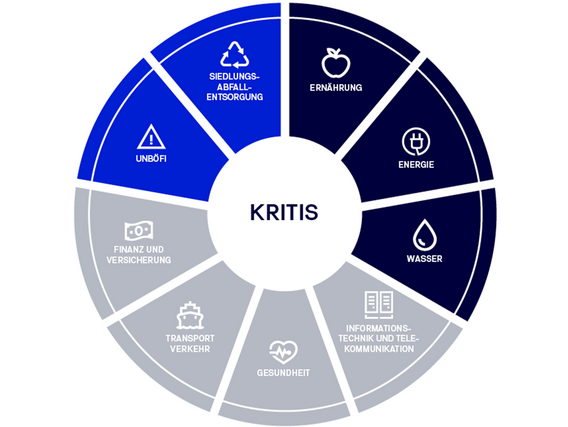The BSI obliges operators of critical infrastructures to fulfil certain requirements. Here you will find an overview of the measures to be implemented:
Companies must register with the BSI as soon as they are identified as a critical infrastructure operator and appoint a contact point. The BSI may independently register operators as critical infrastructure and request access to documents in certain circumstances if they do not fulfil their registration obligation.
With IT-SiG 2.0, systems for attack detection are now explicitly part of the technical and organisational security precautions in KRITIS systems. These must continuously and automatically record and analyse suitable parameters and characteristics from ongoing operations. They should be able to continuously identify and prevent threats and provide suitable remedial measures for any faults that occur. This requirement can be implemented using a Security Operation Centre (SOC) or Security Information and Event Management (SIEM), for example.
The use of SOCs is mandatory from 1 May 2023 at the latest .
KRITIS operators and companies in the special public interest are obliged to provide the BSI with information necessary for incident management in the event of significant incidents.
- Use of critical components
Companies must report the use of critical components in certain sectors. The use of such components may be prohibited. According to Section 2 IT-SiG, critical components are IT products whose failure would significantly impair the function of the system. These components are still defined for the respective sectors.
Operators must take an inventory of critical IT products in KRITIS systems - with up-to-date information on manufacturers and product types. Until now, this only applied to the KRITIS sector of telecommunications.
- Maintaining the critical infrastructure
The KRITIS protection objectives (availability, confidentiality, integrity and authenticity) must be defined on the basis of the operationally relevant parts, included in the risk assessment and considered throughout all processes. The impact on the functionality of the critical infrastructure and the critical service should be the point of reference for the extent of a risk to the general public.
If security precautions are possible and appropriate according to the current state of the art, the operator must implement them. As a general rule, it is not possible to transfer risks, e.g. to insurance companies, and this is no substitute for security precautions.
A purely economic risk assessment is generally not sufficient.
In the form of security audits, KRITIS operators must prove to the BSI every two years that appropriate measures have been implemented and that technology standards have been met, according to Section 8a III BSIG.




